
The Bee Gees were a musical group formed in 1958 by brothers Barry, Robin, and Maurice Gibb. The trio were especially successful in popular music in the late 1960s and early 1970s, and later as prominent performers in the disco music era in the mid-to-late 1970s.

Robin Hugh Gibb was a British singer and songwriter. He gained worldwide fame as a member of the Bee Gees with elder brother Barry and twin brother Maurice. Robin Gibb also had his own successful solo career. Their youngest brother Andy was also a singer.

Maurice Ernest Gibb was a British musician and songwriter. He achieved worldwide fame as a member of the pop group Bee Gees. Although his elder brother Barry Gibb and twin brother Robin Gibb were the group's main lead singers, most of their albums included at least one or two songs featuring Maurice's lead vocals, including "Lay It on Me", "Country Woman" and "On Time". The Bee Gees are one of the most successful pop-rock groups of all time.

Sir Barry Alan Crompton Gibb is a British musician, singer, songwriter and record producer. Along with his younger twin brothers, Robin and Maurice, he rose to worldwide fame as a member of the Bee Gees, one of the most commercially successful groups in the history of popular music. Gibb is well known for his wide vocal range including a far-reaching high-pitched falsetto. Gibb's career has spanned over 60 years.
The Beatles' bootleg recordings are recordings of performances by the Beatles that have attained some level of public circulation without being available as a legal release. The term most often refers to audio recordings, but also includes video performances. Starting with vinyl releases in the 1970s, through CD issues in the late 1980s, and continuing with digital downloads starting in the mid 1990s, the Beatles have been, and continue to be, among the most bootlegged artists.
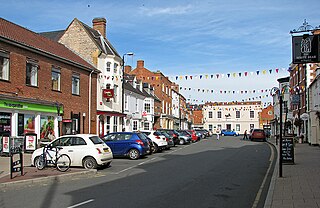
Shipston-on-Stour is a town and civil parish in the Stratford-on-Avon District in southern Warwickshire, England. It is located on the banks of the River Stour, 9 miles (15 km) south-southeast of Stratford-upon-Avon, 10 miles north-northwest of Chipping Norton, 14 miles (22 km) south of Warwick and 14.5 miles west of Banbury. In the 2021 census, Shipston-on-Stour had a population of 5,849.
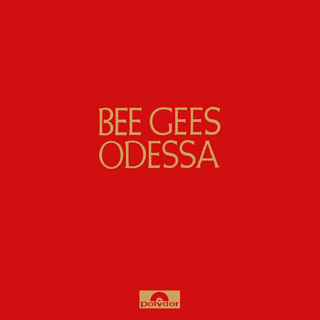
Odessa is the sixth studio album by the Bee Gees, a double vinyl LP released in February 1969, initially in an opulent red flocked cover with gold lettering. Despite reaching the UK Top Ten and the US Top 20, the album was not particularly well-received, though now is regarded by many as the most significant of the group's Sixties albums. An ambitious project, originally intended as a concept album on the loss of a fictional ship in 1899, it created tension and disagreements in the band regarding the work's direction; finally, a dispute over which song to release as a single led to Robin Gibb temporarily leaving the group.
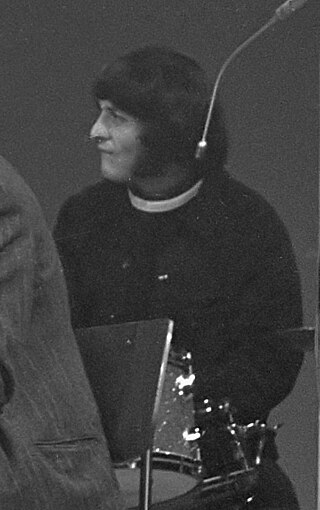
Terence William Harvey 'Terry' Cox played drums in the British folk rock bands The Pentangle, Duffy's Nucleus and Humblebums.

Horizontal is the fourth studio album by the Bee Gees, and their second album to receive an international release. The LP was released in early 1968, and included the international hit singles "Massachusetts" and "World". On 5 February 2007, Reprise Records reissued Horizontal with both stereo and mono mixes on one disc and a bonus disc of unreleased songs, non-album tracks, and alternate takes. The album was released in Polydor in many countries and on Atco only in the US and Canada. "And the Sun Will Shine" was released as a single only in France. The influences displayed on the album range from the Beatles to baroque pop.
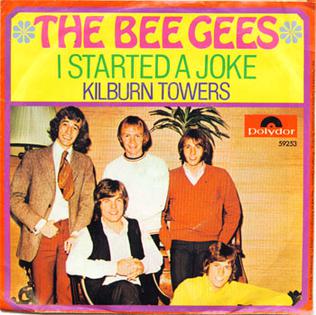
"I Started a Joke" is a song by the Bee Gees from their 1968 album Idea, which was released as a single in December of that year. It was not released as a single in the United Kingdom, where buyers who could not afford the album had to content themselves with a Polydor version by Heath Hampstead. This is the last Bee Gees single to feature Vince Melouney's guitar work, as he left the band in early December after this song was released as a single.
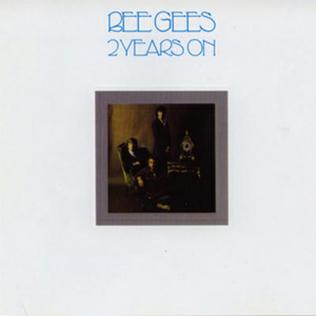
2 Years On is the eighth studio album by the Bee Gees, which reached No. 32 on the US charts. Released in 1970, the album saw the return of Robin Gibb to the group after an earlier disagreement and subsequent split following Odessa. 2 Years On was the first album with drummer Geoff Bridgford, who remained a full-time member of the group until 1972 although he was not pictured on the sleeve. The best-known track is "Lonely Days". Released as the first single by the reunited brothers, it charted high in the US, but peaked at No. 33 in the United Kingdom.
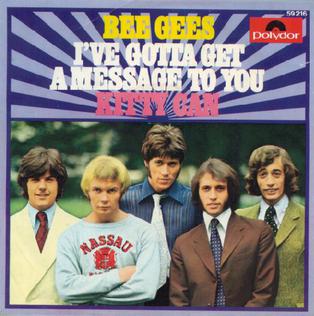
"I've Gotta Get a Message to You" is a song by the Bee Gees. Released as a single in 1968, it was their second number-one hit in the UK Singles Chart, and their first US Top 10 hit. Barry Gibb re-recorded the song with Keith Urban for his 2021 album Greenfields.
"I Can't See Nobody" is a song by the Bee Gees, released first as the B-side of "New York Mining Disaster 1941". With "New York Mining Disaster 1941", this song was issued as a double A in Germany and Japan, and included on the group's third LP, Bee Gees' 1st. "I Can't See Nobody" charted for one week at number 128 on the Billboard Bubbling Under the Hot 100 in July 1967.

Robin's Reign is the first solo album by British singer Robin Gibb, a member of the Bee Gees with his brothers Barry and Maurice. Robin had left the group following a disagreement with his brother Barry over who should sing lead vocals. The album was not a commercial success, though it did spawn Gibb's solo hit, "Saved by the Bell". The other songs in the album were produced by Gibb, and the rest was produced with his manager, Vic Lewis. This album was reissued by RSO Records in 1978 and reissued in 1991 on Spectrum Records. The album had a limited CD release in Germany and was made available digitally on Amazon and Spotify in 2011 and iTunes the following year. Gibb would not release another solo album until 1983.

The Kid's No Good was to have been the debut solo album by British musician Barry Gibb following his departure from the Bee Gees in December 1969. There was no official title given to the album at the time. The line "the kid's no good", which the album is commonly titled on several bootleg releases, is also featured in the Bee Gees song "Come Home Johnny Bridie" on the 1973 album Life in a Tin Can. The album features orchestral arrangements by Bill Shepherd who performed the same role for the Bee Gees from 1965 to 1972.

"Saved by the Bell" is a 1969 single written and recorded by Robin Gibb. It was released in June 1969, and has been certified gold. It was the lead single on Gibb's debut album Robin's Reign, released in early 1970. According to Vinyl Records, the song was co-produced by Kenny Clayton. Gibb also made a promotional video for this song. The song gained commercial success in Europe, but was a commercial failure in the US.

"One Million Years" is a single released by Robin Gibb in 1969 with the B-side "Weekend". The single did not chart in Britain. Recorded during sessions for Robin's Reign it was only included on the German LP and CD version as the last track. Produced by Gibb with his new manager Vic Lewis. Kenny Clayton conducts the orchestra for this song.
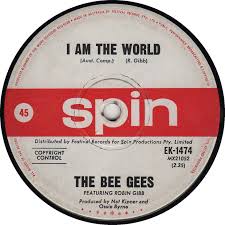
"I Am the World" is a song recorded by the Bee Gees, written and sung by Robin Gibb. It was released as the B-side of "Spicks and Specks". Later, it was included on the compilation Rare, Precious and Beautiful, Vol. 3 in 1969. It featured trumpet played by Geoff Grant. Its CD version was released in 1998 on the compilation Brilliant from Birth.
"Black Diamond" is a song by the Bee Gees released on the album Odessa in 1969. The song was written by Barry, Robin & Maurice Gibb and featured lead vocals by Robin Gibb. It was included on the compilation Marley Purt Drive released in 1970.
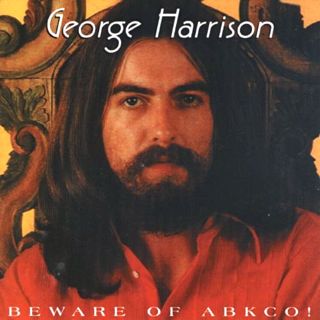
Beware of ABKCO! is a bootleg album of songs performed by English rock musician George Harrison in May 1970. It contains songs that were under consideration for Harrison's triple album All Things Must Pass, his first release as a solo artist following the break-up of the Beatles. The performances were taped in a single session at Abbey Road Studios in London, on 27 May 1970, for the benefit of Harrison's co-producer, Phil Spector. Seven of the fifteen songs were subsequently recorded formally for inclusion on All Things Must Pass, as was "Everybody, Nobody" after Harrison reworked it as "Ballad of Sir Frankie Crisp ". From its 1994 release by Strawberry Records, the bootleg provided the only available record of five songs that Harrison never revisited during his career. Among these is a 1968 collaboration with Bob Dylan titled "Nowhere to Go". All fifteen songs were officially released in August 2021, as part of the Uber and Super deluxe editions of the All Things Must Pass: 50th Anniversary box set.

















